Aug 11, 2015
United Nations Special Rapporteur on Freedom of Association, Maina Kiai, gave a video greeting to the more than 240 participants at the Solidarity Center Labor Migration Conference in Indonesia in August.
“International law is very clear that you have your rights wherever you are–that you don’t lose your rights when you leave your country,” Kiai said.
Listen to his full message.
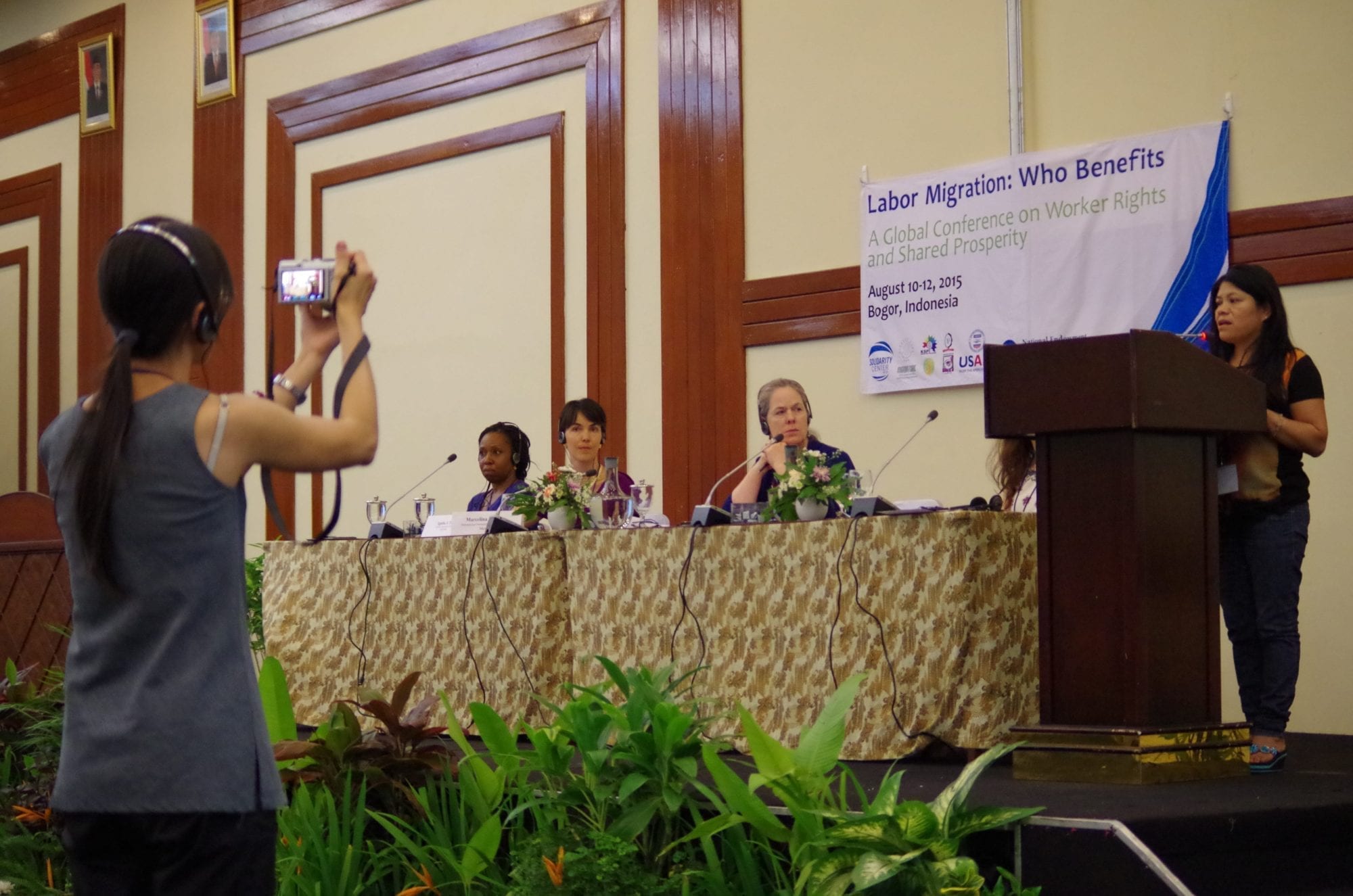
Aug 11, 2015
Participants in Monday’s final session of the Solidarity Center labor migration conference engaged in a lively discussion with panelists in a discussion of migrant workers’ vulnerability to gender-based violence.
Lisa McGowan, senior specialist for gender equality, outlined the broad picture, pointing out that gender-based violence is “one of the most widespread human rights violations in the world,” and migrant workers are especially at risk of gender-based violence because they are often invisible.
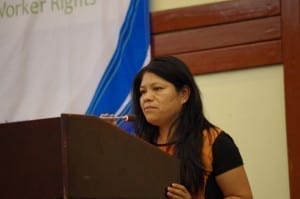
“Domestic workers suffer violence for being women, migrants and indigenous people.”–Marcellina Bautista, leader of the Center of Support and Training for Domestic Workers.
Credit: Solidarity Center/Kate Conradt
Describing her work organizing and supporting domestic workers, many of whom are migrants, Marcellina Bautista, the leader of the Center of Support and Training for Domestic Workers (CACEH), said that “domestic workers suffer violence for being women, migrants and indigenous people.”
Bautista, who worked as a domestic worker for many years, says domestic workers encounter “all kinds of violence in the homes where we work.”
“The majority of the 2.3 million people in Mexico who do domestic work are women and girls” who are highly vulnerable to gender-based violence, says Bautista, who also serves as International Domestic Workers Federation (IDWF) regional coordinator for Latin America.
The CACEH works with domestic workers who face workplace violence, helping migrant workers understand that they have the same rights as other workers in Mexico.
Farm work is another sector where women workers are especially vulnerable to gender-based violence, and Agatha Schmaedick Tan discussed the Coalition of Immokalee Workers’ (CIW) efforts to end sexual harassment and violence among tomato pickers in Florida. Tan cited a study that found some 80 percent of female farmworkers had experienced sexual harassment at work in 2010.
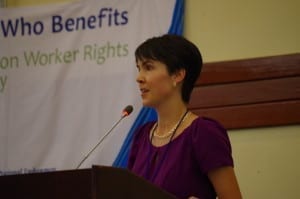
“Sexual harassment on the job persists worldwide,” Agatha Tan, counsel for the Coalition of Immokalee Workers. Credit: Solidarity Center/Kate Conradt
Describing Immokalee, Florida, as “not a town, but a labor reserve,” Tan outlined CIW’s path breaking Fair Food Program, which CIW negotiated with growers and which 14 major corporations have signed. Under the code, which covers as many as 100,000 workers in a year, farms must comply with fundamental labor standards, including preventing violence and sexual harassment at work. Corporations agree to buy only from farms that comply, and auditors annually evaluate the farms. Some 90 percent of Florida tomato growers have signed on to the program.
“Sexual harassment and violence on the job is illegal in most countries, yet sexual harassment on the job persists worldwide due in part to the difficulties of enforcement,” she said.
Closing the panel, Chidi King, International Trade Union Confederation Equality Department director, told participants: “We as a labor movement have not done enough to bring (gender-based violence at work) to the fore of our agendas. We still see this as a personal issue,” not one to be dealt with at the organizational level.
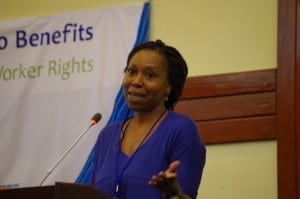
Chidi King, ITUC Equality Department director, rallied participants to push for an ILO standard on gender-based violence at work. Credit: Solidarity Center/Kate Conradt
King noted that the ILO has not taken up gender-based violence because of resistance of “very regressive governments,” and urged participants to push the ILO to create a standard covering gender-based violence.
“When you’re talking about your organization’s activities, have this front and center. It cannot be an issue we continue to remain silent about.”
More than 200 participants are taking part in the Aug. 10-12 event, Labor Migration: Who Benefits? A Solidarity Center Conference on Worker Rights & Shared Prosperity.
Follow the conference on the website and on Twitter @SolidarityCntr.
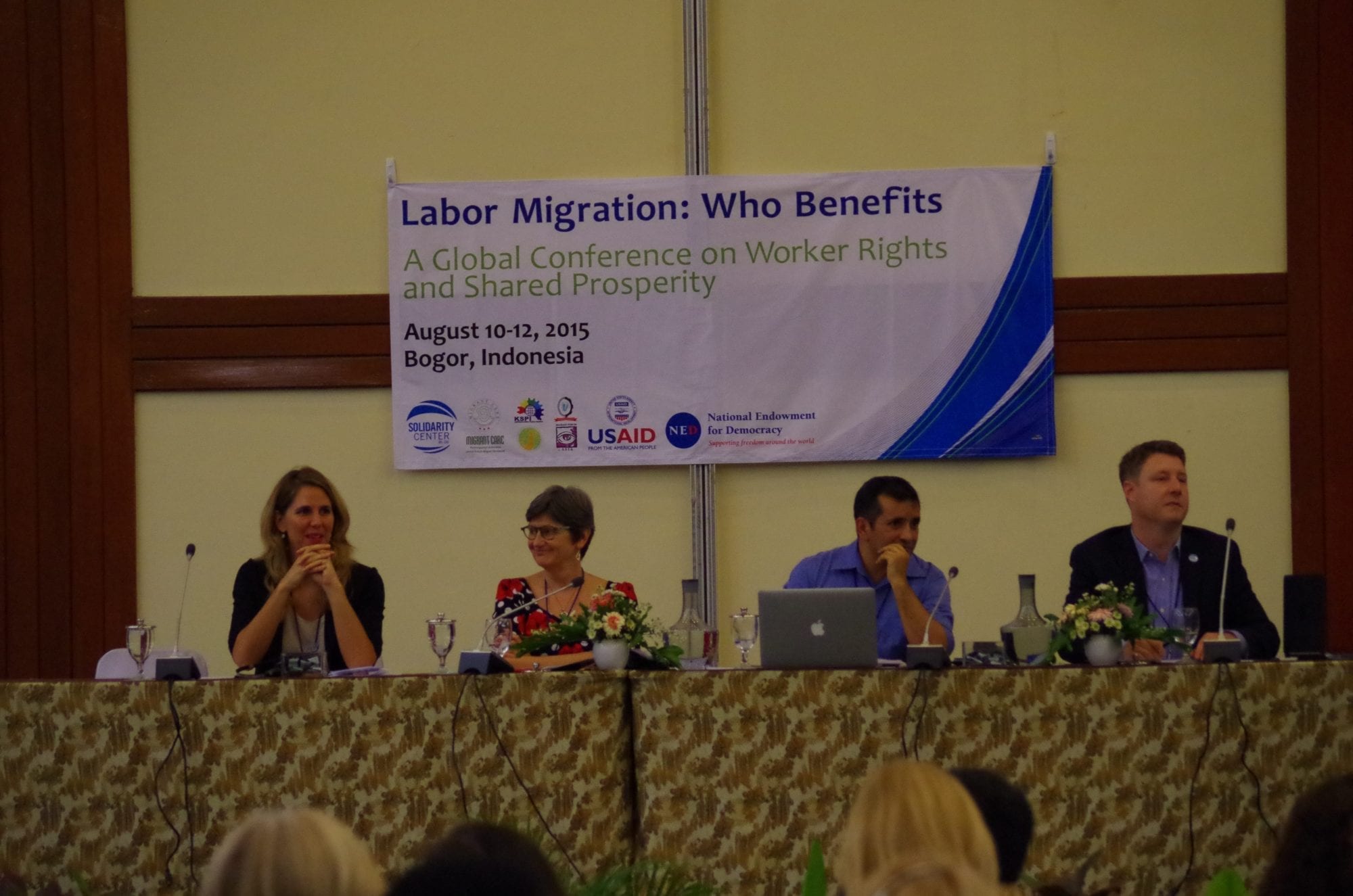
Aug 10, 2015
Asia’s growth as a global factory comes at a price, says Sanjiv Pandita, executive director of the Asia Monitor Resource Center (AMRC) in Hong Kong, Special Adminstrative Region of China.
“The most important point is that migrant workers pay the price,” he said. In fact, Asia has more than 70 percent of global vulnerable workers—nearly 1 billion.
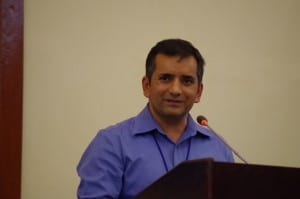
Migrant workers pay the price for globalization.–Rajiv Pandita, executive director of the Asia Monitor Resource Center (AMRC). Credit: Solidarity Center/Kate Conradt
Pandita, whose organization promotes democratic labor in Asia, spoke on the panel, Precarious Work and Labor Migration, the first portion of the Monday afternoon plenary Labor Migration: Who Benefits? A Solidarity Center Conference on Worker Rights & Shared Prosperity.
“The story takes place in the intricate network of supply chains,” Pandita says. Global supply chains account for 80 percent of global trade, and Asia accounts for 50 percent of that portion.
“The systematic marginalization of migrant workers is a crisis for democracy.”
Panel moderator John Hosinski, Solidarity Center senior program officer for Africa, defined precarious work as characterized by low wages, unstable employment and is legally ill-defined, which leads to the exclusion of workers from laws that enable them to form unions and gain power to achieve decent work.
Describing the years of apartheid South Africa, Jane Barrett, affiliate support coordinator, Congress of South African Trade Unions (COSATU), pointed out that apartheid was based on large-scale, cheap labor, control of internal migration and short-term contracts with no economic or social rights for all black workers.
“Apartheid is similar to cross-border migration today.”
Barrett described the efforts of COSATU and its affiliates to organize and support migrant workers, including the Food and Allied Workers Union’s focus on organizing migrants in cross border trade and the National Union of Mineworkers’s campaign for permanent residency of migrant workers.
A fundamental part of empowering migrant workers, Barrett says, is first educating union members in a federation-wide awareness campaign, one that involves challenging assumptions and providing a new way of seeing migrant workers.
Closing the session, Alison Friedman, vice president of the Global Fund to End Slavery, challenged participants to successfully convey the economic argument for migrant worker rights as well as the moral argument. Friedman said companies that are leaders in providing decent work for migrant workers say they do so because it helps their bottom line—workers who earn a living wage in safe and healthy workplaces are much better workers.
Aug 10, 2015
Another union leader in Honduras, where violence is commonplace, has received a death threat. José Armando Flores Jimenez, president of the Union of Health Workers in eastern Honduras-SITRASAOH, was threatened for allegedly making public the discovery of medications buried on the grounds of Health Region Number Seven buildings in El Paraiso, possibly to divert them from public use.
Flores, a member of the Network Against Anti-Union Violence in Honduras, is the second member of that network to be targeted for violence.
The first, Héctor Martínez Motiño of the university workers’ union SITRAUNAH, was shot and killed by gunmen in June as he drove home from work after three other attempts on his life and numerous anonymous threats, linked to his reporting of violations of human and worker rights within the university.
The Network Against Anti-Union Violence in Honduras is comprised of labor union activists and the human rights non-governmental organization ACI-Participa, and is supported by the Solidarity Center.
Honduran trade unionists are routinely threatened, intimidated, harassed and even murdered, and criminals are rarely brought to justice. A damning report documenting widespread and serious violations of labor rights in Honduras was issued by the U.S. Department of Labor in March this year and was prompted by a complaint filed in 2012 by the AFL-CIO and 26 Honduran unions and NGOs under the Labor Chapter of the Central America Free Trade Agreement (CAFTA).
Learn more here.
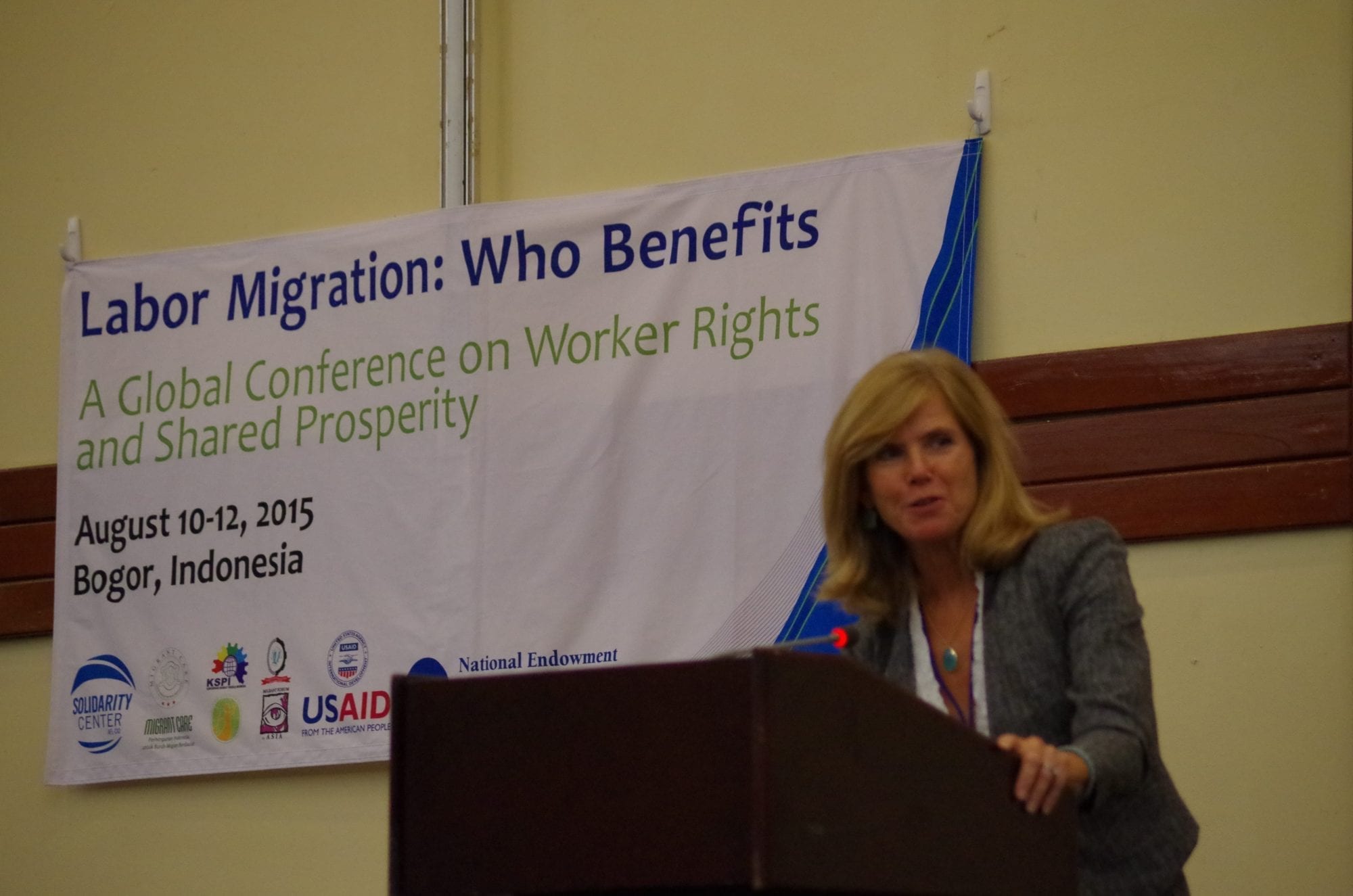
Aug 10, 2015
Highlighting the rampant economic inequality across the globe that is in part driving people to migrate for work far from their homes, Michelle Leighton, chief of the Labor Migration Branch at the International Labor Organization (ILO), provided a detailed look at the ILO’s current and planned response to addressing the many challenges migrant workers face in getting decent work.
“We face the largest crisis of human mobilization since World War II,” Leighton said in her keynote speech this morning at Labor Migration: Who Benefits? A Solidarity Center Conference on Worker Rights & Shared Prosperity.
“News seems to come almost daily about the crisis that drives people to seek an economic life somewhere else,” she said, pointing out that 1.5 billion people are living in places other than their homes.
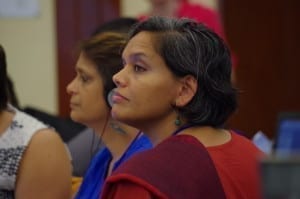
Participants at the Solidarity Center labor migration conference. Credit: Solidarity Center/Kate Conradt
Among the challenges to ensuring migrant workers have a chance at shared prosperity is the anti-migrant stance of some countries. “Shutting doors won’t solve the problem. It pushes the problem to others to solve.”
Leighton also touched on the key issue of labor recruitment, which she described as one of the most unregulated areas in all migration governance.
“Migrants pay thousands and thousands of dollars to get a job,” but the recruitment process is where migrants “have a much higher chance of being engaged in human trafficking.” Even when governments have regulations on recruitment, it often does not matter because so many illegal recruiters operate with impunity.
The ILO is helping push ratification of the fair migration convention and is also working with the International Trade Union Confederation (ITUC) to collect data on migrant workers because so little information exists. In a survey of 120 countries, preliminary data show that about 75 percent of adult migrants age are migrant workers.
In short, Leighton said, “creating decent work at home” is among the keys at the heart of the strategies for ensuring all workers, including migrant workers, take part in shared prosperity.
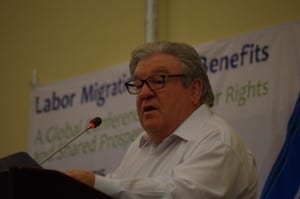
Our vision is one of “shared prosperity and fairness” –Jim Boland, president of the International Union of Bricklayers & Allied Craftworkers. Credit: Solidarity Center/Kate Conradt
Leighton was part of a panel moderated by ITUC Equality Department Director Chidi King and was introduced by Jim Boland, president of the International Union of Bricklayers & Allied Craftworkers.
Drawing on his experience as an Irish immigrant to the United States, Boland discussed the plight of migrant workers, but noted that even as migrant workers face poverty, discrimination and violence, “they are organizing in their community to end discrimination and violence and amplify their voices.”
“While many migrant workers are forced into poverty, with a lack of decent work and violence, migrant workers are mobilizing and developing innovative strategies for building worker power. Collective bargaining and a voice through unions is a key to developing the strength migrant workers need to ensure they have decent work, he said.
Boland urged conference participants to “use this opportunity to forge new partnerships and strengthen the connection with our brothers and sisters within the region and…take these strategies back home and push policy makers for a more just system.”
Our vision, Boland said, is one of “shared prosperity and fairness.”
Follow the conference on the website and on Twitter @SolidarityCntr.









